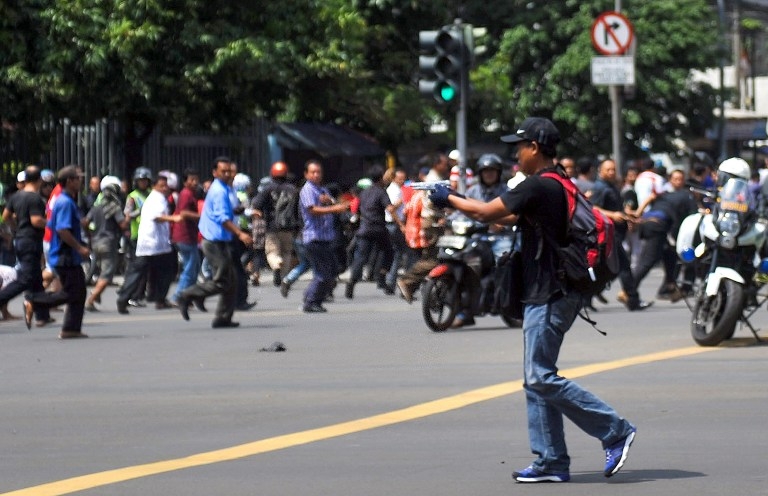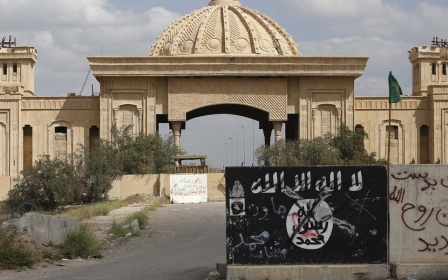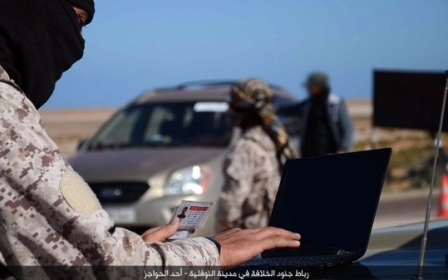Jakarta attack raises spectre of IS's spreading influence

Thursday's attack that brought deadly mayhem to the streets of Jakarta highlighted the growing danger posed by the Islamic State (IS) group in southeast Asia and its plans to establish a "satellite state" in the region, security analysts suggest.
But others expressed scepticism over IS's claim of responsibility for the attack, which they said was more likely a "copycat" operation, or even an attempt to gain the attention of the group’s leadership.
IS claimed responsibility for the attack on a busy central district of the Indonesian capital which left at least two people dead and 20 others injured after suspected suicide bombers set off explosives, and gunmen grabbed hostages and exchanged fire with security forces.
In a statement, the group described the attackers as "soldiers of the Caliphate" and said the target of the attack had been citizens from the "Crusader coalition," referring to the US-led alliance of countries combating IS in Iraq and Syria.
Police in Indonesia also compared the style of the attack to November's IS-orchestrated attacks in Paris that killed 130 people.
The attack came weeks after IS had threatened attacks against the world's most populous Muslim nation where Rohan Gunaratna, head of the International Centre for Political Violence and Terrorism, said 22 local groups had pledged allegiance to Abu Bakr al-Baghdadi, IS's self-declared caliph, since 2014.
Gunaratna told Middle East Eye that IS cells in Indonesia were being directly controlled from an "overseas operations room" in Syria and said the group planned to mount a major attack as a springboard to declaring the creation of an IS province in the region.
"This attack was not inspired by IS. It was directed by IS," said Gunaratna.
"These are cells directly controlled by IS. IS has created an external operations room in Syria and the directors of that operations room are Indonesians.
"Those Indonesians are working with both established groups that have pledged allegiance to Baghdadi and with IS cells located in Indonesia."
Gunaratna said IS had planned to stage a major attack in Jakarta but had been disrupted in its plans by the security forces, who he said had "detected and disrupted" two other cells in December.
"This attack was carried out by a third network that had evaded capture. If the other cells had not been dismantled, the attack that took place today would have been much worse," he said.
Groups 'falling over themselves to pledge allegiance'
But Susan Sim, vice president for Asia of the Soufan Group security consultancy, said Thursday’s attack appeared to have been the work of an IS-linked individual attempting to prove himself to the group and assert his leadership over its regional operations.
“There have been extremist groups in Indonesia falling over themselves to pledge allegiance to IS. They have been largely ignored by the IS leadership other than as possible sources of foreign fighters and members of the caliphate IS claims to be creating,” Sim told MEE.
“The Indonesian police have named an Indonesian fighter currently with IS in Syria as inspiring today's attacks. The emerging picture, from what has been revealed, is that this fighter, one Bahrum Naim from Solo, Central Java, wants to claim the mantle of leadership of IS in Southeast Asia.
“In other words, he was trying to prove his bona fides. He might not have obtained sanction from IS leaders to plan this attack. I would thus say the Jakarta attacks were IS-inspired but might not have been IS-orchestrated if you're looking for direct organisational links.”
Other analysts said they believed Thursday’s attack was more likely to have been carried out by local militants claiming common cause and allegiance with IS but with no organisational links to the group.
"The likelihood is very small that direct orders were issued from Raqqa," Carool Kersten, an expert on Islam in southeast Asia, told MEE.
"The security forces in Indonesia are talking about an imitation, which is a persistent feature of the new global phenomenon of violent Islamism in which copycatting has become quite usual."
Kersten said that both IS and those responsible stood to gain from associating the attack with the group.
"ISIS [IS] can claim that its tentacles stretch all the way across the Indian Ocean and the local perpetrators can say, 'We are not just a local operation, we are part of something bigger.'"
'Robust counter-narrative'
While Indonesia has had a long history of domestic religious-inspired violence, with groups such as Jemaah Islamiyah (JI) having long sought to establish their own version of a caliphate, Kersten said that local militants had only sought common cause with international groups since the emergence of al-Qaeda and the Bali bombings by JI that killed 202 people in 2002.
While IS had usurped al-Qaeda in winning the allegiance of local militant organisations, Kersten said the group’s influence was still relatively limited.
A report by the Soufan Group into foreign fighters in Syria and Iraq published last month suggested that the number of Indonesians involved was closer to 500 than the official government figure of 700.
“If you offset intelligence estimates suggesting that the number of Indonesians who have gone to Syria is in the hundreds against the fact that this is the biggest Muslim nation state with more than a quarter of a billion people, that suggests they are still very small,” said Kersten.
“What authorities don’t know about is sympathy for IS on the domestic scene and to what extent sympathisers are prepared to engage in violence and acts of terrorism.”
Kersten also cited the use of the hashtag #KamiTidakTakut, meaning “We are not afraid” on social media as evidence of a “robust counter-narrative” to which most Indonesians subscribed.
“Most Indonesian Muslims are proponents of their own homegrown Indonesia-specific Islam which on the wider spectrum is usually referred to as liberal, moderate and even progressive in its outlook.”
New MEE newsletter: Jerusalem Dispatch
Sign up to get the latest insights and analysis on Israel-Palestine, alongside Turkey Unpacked and other MEE newsletters
Middle East Eye delivers independent and unrivalled coverage and analysis of the Middle East, North Africa and beyond. To learn more about republishing this content and the associated fees, please fill out this form. More about MEE can be found here.




